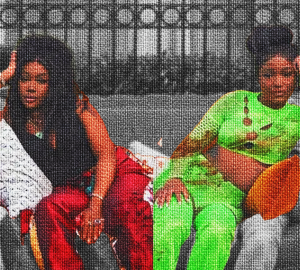I have a bone to pick with Black movies… Here’s why
The realm of Black cinema has always been something I’ve had a lot of opinions on. Anyone who knows me, knows that I’ve always been very critical of black filmmakers because— and I know I’m not alone in this— I am tired of seeing the same stories over and over and over and over again! And you know I’m upset because I used an exclamation mark. I never use exclamation marks but I need everyone to know how tired I am.
Aren’t we sick of seeing slave movies, or movies about police brutality? Movies that take place in the “hood” where the most lovable character dies tragically in the end by gun violence? And don’t even get me started about Tyler Perry. Don’t get me wrong, I understand the catharsis that comes from creating or watching a film that understands the pain and trauma our people have. I also recognize how outstanding filmmakers like Tyler Perry and the things they’ve been able to accomplish are admirable. But, I think it’s time we begin broadening our horizons, right?
At first, when I began thinking about this topic to write about it, I think I was misinterpreting who the true audience is for these movies. My approach towards the beginning of coming up with this article was that these movies would make Black people seem one dimensional to those outside of the community. And while that may be accurate to a degree, how many non-black people do you know have seen all of “Roots” or know who Madea is? These stories aren’t for people outside of the Black community, these stories are being made for us.
But then I asked myself, “if these stories are made by Black people, for Black people, what’s the issue?” Well, in a nutshell, I think Black people can be more creative than that. Why are we limiting ourselves to retelling the same painful stories we live through? Why not create movies that celebrate all the reasons why we should love ourselves, not feel disappointed by the life and history we’re handed?
That is what I admire most about people like Issa Rae and Jordan Peele. They use Black people in their stories as a way to add vibrance and soul, not be a learning lesson or historic reminder or comfortable cliche for the audience. It’s an opportunity for people outside of the community to unlearn what Black cinema is, understanding that it isn’t just for Black people, but it’s a valuable and enriching experience for everyone to enjoy.
Black artists are now able to penetrate the media and give the world a splash of our color, exposing new eyes to how creative and amazing we are. Marvel’s “Black Panther” demonstrated how impactful movies can be in this way. Every little Black boy was T’Challa for Halloween and people who may not have understood how rich (with resources, money and culture) Africa and its people are, were able to see it on magnificent display. We see it with Jordan Peele. The way he is consistently breaking barriers and debunking terrible stereotypes with his films. He has redefined the scare with his culturally attuned, socially aware angle to horror. Even further, he tore through his own cliches with his recent picture, “Nope”.
Don’t get me wrong, I will eat up “Diary of a Mad Black Woman” every time it comes on. And, I think the classic Black movies my mom made me watch as a kid are iconic for a reason. However, I do think as society progresses, art does too. And Black people are so resilient, we deserve to have all sides of our culture be displayed and celebrated. White filmmakers have been able to just create whatever they’d like without having to carry the burden of history on them, are we able to do the same? I think so, and I think it’s already happening.
If you want a good Black romance, watch “The Photograph” with Issa Rae and Lakeith Stanfield. If you’ve been craving a comforting yet, psychedelic experience, check out Kid Cudi’s “Entergalactic” on Netflix. If you like Avant Garde, absurdist film, watch “Sorry To Bother You”. And of course, for the culture, everyone needs to see “Black Panther: Wakanda Forever”. No superhero movie has ever made me cry so much in public, ever. With all that being said, Happy Black History Month!


























